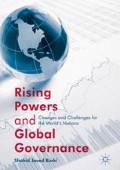Abstract
Had Vladimir Putin not ascended to the top of the Russian political system, Moscow might have been content to play the role of an emerging economic and political entity. This was the hope of the West when, post-Cold War, Russia was invited to join the Bretton Woods institutions—the IMF and the World Bank—and its application of membership in the WTO was given Western support. In addition, Moscow was invited to become a member of the exclusive club of rich nations. Its admission turned the G7 into the G8.
But once in power, Putin was not willing to reduce his country to the status of a small global power relative to the United States and Germany in the G8 cluster and China outside it. The Russian president was both nostalgic about the past and impatient about the future. During his second tenure he made attempts to resurrect the Soviet Union by using force at times to change the boundaries of Russia. In this endeavor the Crimean Peninsula was taken from Ukraine and reintegrated with Russia. At the same time, Moscow has been busy carving out some other bits of Ukraine where significant numbers of Russians are resident. Not only that, Moscow tried hard to develop what it hoped would be strong relations with the countries in Central Asia that were once part of the Soviet Union. This chapter attempts to answer the question: how should Russia under Putin be viewed?
Access this chapter
Tax calculation will be finalised at checkout
Purchases are for personal use only
Notes
- 1.
Daron Acemoglu and James Robinson, Why Nations Fail: The Origins of Power, Prosperity, and Poverty, New York: Crown Books, 2013.
- 2.
Steven Lee Myers, The New Tsar: Reign of Vladimir Putin, New York: Knopf, 2015.
- 3.
Walter Laqueur, Putinism: Russia and its Future with the West, New York: St. Martins, 2015.
- 4.
Daniel Treisman, “How to explain Putin’s arrogance and aggression?” The Washington Post: Book Review, September 27, 2015, pp. B6–B7.
- 5.
Marvin Kalb, Imperial Gamble: Putin, Ukraine and the New Cold War, Washington, DC: Brookings Press, 2015.
- 6.
Levada Center, “From opinion to understanding: August 15, 2015 ratings,” Moscow, September 7, 2015.
- 7.
Karoun Demirijain, “Sanctions on Russia extended,” The New York Times, June 23, 2015, p. A6.
- 8.
Karoun Demirijain, “Putin set to add ICBMs to arsenal,” The New York Times, June 17, 2015, p. A10.
- 9.
Neil MacFarquhar, “Russia answers U.S. criticism over military aid to Syria,” The New York Times, September 8, 2015, pp. A1 and A4.
- 10.
Eric Schmitt and Michael R. Gordon, “Russia moves in Syria widen role in the Mideast,” The New York Times, September 15, 2015, pp. A1 and A10.
- 11.
Eric Schmitt and Neil MacFarquhar, “Russia fleet in Syria with jets that can attack targets on ground,” The New York Times, September 22, 2015, p. A11.
- 12.
Peter Baker, “Obama seeks a meeting with Putin in New York,” The New York Times, September 24, 2015, p. A19.
- 13.
Neil MacFarquhar, “By focusing on Syria, Putin is catering to an audience at home,” The New York Times, September 27, 2015, p. 11.
- 14.
The Lancet, “Mass privatization and the post-communist mortality crisis,” February 12, 2009.
- 15.
Mark Adomanis, “Russia’s demography just took a significant turn for the worse,” Forbes, March 12, 2015, retrieved September 3, 2015.
- 16.
Joseph Nye and David A. Welch, Understanding Global Conflict and Cooperation, New York: Pearson, 2012.
- 17.
Jacob Pousther, “Russians warm to China as relations with U.S. cool,” Facttank: News in Numbers, Pew Research Center, July 8, 2015.
- 18.
Jane Perlez and Neil MacFarquhar, “Friendship between Putin and Xi becomes strained as economies falter,” The New York Times, September 3, 2015, pp. A1 and A5.
- 19.
Yuri Levada Analytical Center, “From opinions to understanding: Relations with other countries,” Moscow, August 21, 2015.
- 20.
Sabrina Tavernise, “Why Russians hate America, again,” The New York Times, September 14, 2015, pp. A1 and A4.
- 21.
Sabrina Tavernise, “Inflation robs Russians of buying power,” The New York Times, August 18, 2015, p. A9.
- 22.
Sabrina Tavernise, “With Ruble’s decline, Russian tourists gain appreciation for the motherland,” The New York Times, August 30, 2015, p. A6.
- 23.
Jim O’Neill, “Building better global economic BRICs,” Global Economics Paper No. 66, Goldman Sachs, November 30, 2001.
Author information
Authors and Affiliations
Copyright information
© 2017 The Author(s)
About this chapter
Cite this chapter
Burki, S.J. (2017). Russia: A Revanchist State. In: Rising Powers and Global Governance. Palgrave Macmillan, New York. https://doi.org/10.1057/978-1-137-59815-8_5
Download citation
DOI: https://doi.org/10.1057/978-1-137-59815-8_5
Published:
Publisher Name: Palgrave Macmillan, New York
Print ISBN: 978-1-349-94917-5
Online ISBN: 978-1-137-59815-8
eBook Packages: Political Science and International StudiesPolitical Science and International Studies (R0)

